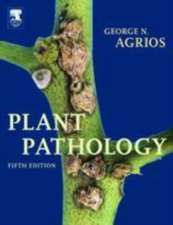Recent Advances in the Diagnosis and Management of Plant Diseases
Editat de L.P. Awasthien Limba Engleză Hardback – 28 noi 2015
This book highlights recent advances made in the development of new types of resistance in host plants and alternative strategies for managing plant diseases to improve food quality and reduce the negative public health impact associated with plant diseases. Having entered into 21st century advancements in the Diagnosis of Plant Pathogens and Plant Disease Management need to be closely examined and adequately applied, so that newer challenges facing plant pathology could be adequately addressed in attaining food security for the growing population.
Substantial advancements have been made in terms of expanding knowledge base of the biology of plant-microbial interactions, disease management strategies and application and practice of Plant Pathology. Application of molecular biology in Plant Pathology has greatly improved our ability to detect plant pathogens and in increasing our understanding, their ecology and epidemiology. Similarly, new technologies and resources have been evolved for the development of sustainable crop protection systems by different control strategies against various pests and pathogens that are important components of the integrated pest management programme. Natural products and chemical compounds discovered as a result of basic research and molecular mechanisms of pathogenesis have led to the development of “biorational” pesticides. Biological control has been found to be the most significant approach to plant health management during the twentieth century and promises using modern biotechnology, to be even more significant in the twenty-first century.
| Toate formatele și edițiile | Preț | Express |
|---|---|---|
| Paperback (1) | 948.92 lei 6-8 săpt. | |
| Springer India – 23 aug 2016 | 948.92 lei 6-8 săpt. | |
| Hardback (1) | 814.75 lei 38-44 zile | |
| Springer India – 28 noi 2015 | 814.75 lei 38-44 zile |
Preț: 814.75 lei
Preț vechi: 1072.04 lei
-24% Nou
Puncte Express: 1222
Preț estimativ în valută:
155.92€ • 161.79$ • 130.32£
155.92€ • 161.79$ • 130.32£
Carte tipărită la comandă
Livrare economică 11-17 martie
Preluare comenzi: 021 569.72.76
Specificații
ISBN-13: 9788132225706
ISBN-10: 8132225708
Pagini: 306
Ilustrații: XV, 294 p. 52 illus., 30 illus. in color.
Dimensiuni: 178 x 254 x 20 mm
Greutate: 0.93 kg
Ediția:1st ed. 2015
Editura: Springer India
Colecția Springer
Locul publicării:New Delhi, India
ISBN-10: 8132225708
Pagini: 306
Ilustrații: XV, 294 p. 52 illus., 30 illus. in color.
Dimensiuni: 178 x 254 x 20 mm
Greutate: 0.93 kg
Ediția:1st ed. 2015
Editura: Springer India
Colecția Springer
Locul publicării:New Delhi, India
Public țintă
ResearchCuprins
1. Commercialization of Microbial Biopesticides for the Management of Pests and Diseases.- 2. Management of Plant Diseases in Organic Agriculture.- 3. Morphological and Molecular Diagnosis of Fusarium sps. Causing Wilt Diseases of Crop Plants.- 4. Damping-off Disease of Seedlings in Solanaceous Vegetables: Current Status and Disease Management.- 5. Downy Mildew of Cucurbits and Their Management.- 6. Current Status of the Diseases of Lentil (Lens culinaris Medik).- 7. Botrytis Grey Mould of Chickpea (Cicer arietinum L.).- 8. Fungal Diseases of Okra (Abelmoschus esculentus L.) and their Integrated Management (IDM).- 9. Sheath Blight Disease of Paddy and their Management.- 10. Diagnosis and Management of Bacterial Plant Diseases.- 11. Recent Developments in Bacterial Blight of Pomegranate and its Management.- 12. Plant Viral Disease Management through Botanicals.- 13. Yellow Vein Mosaic Disease – A New Threat to Mesta (Hibiscus Sp.) Cultivation.- 14. Biology, Epidemiology, and Managementof Soybean Mosaic Virus in Soybean (Glycine max (L.) Merrill).- 15. Boerhaavia diffusa, Derived Antiviral : A Novel, Ecofriendly Approach for the Management of Viral Infections.- 16. Nematode Diseases of Crops.- 17. Recent Advances in Diagnosis and Management of Diseases of Vegetable Crops.- 18. Novel Detection Techniques for Plant Pathogens and Their Application in Disease Management.- 19. New Molecular Techniques for Detection and Diagnosis of Plant Pathogens.- 20. Plant Nutrition in Management of Plant Diseases with Special Reference to Wheat.- 21. Nutritional Disorders of Citrus and Their Management.
Notă biografică
Prof. L.P. Awasthi is a distinguished scientist who has made significant contributions to the field of Plant Pathology in general and Plant Virology in particular. He did his PhD in Botany (Plant Pathology/Virology) from Lucknow University, Lucknow. Prof. Awasthi’s professional experience includes more than 40 years of teaching and research in Plant Pathology. He has guided 77 M.Sc. (Ag.) and 35 PhD students. The major areas of his research interest include:
Prof. Awasthi has published more than 350 research papers in foreign and Indian journals of repute, many popular articles in Hindi and English in Agriculture journals/bulletins, laboratory manuals and has a lot of contributory chapters in edited books.
Prof. Awasthi visited Karl-Marx University Leipzig, University of Berlin, Institute of Plant Pathology, Ascherslavan, and Haale University, Germany. Prof. Awasthiis working as an Editor/Referee in the editorial boards of many Indian and foreign journals. Apart from this he is a member of several national, state level committees and many professional societies. He has been conferred Plant Pathology Leadership Award by Indian Phytopathological Society, India for his outstanding contributions, scientific excellence and distinguished services for the cause of Plant Pathological Research, Education and Technology dissemination, which has impacted Science of Plant Pathology in the country.
- The diagnosis and characterization of viral diseases of important crop plants.
- Molecular characterization and the mode of action of resistance inducing defensive antiviral proteins from plants.
Prof. Awasthi has published more than 350 research papers in foreign and Indian journals of repute, many popular articles in Hindi and English in Agriculture journals/bulletins, laboratory manuals and has a lot of contributory chapters in edited books.
Prof. Awasthi visited Karl-Marx University Leipzig, University of Berlin, Institute of Plant Pathology, Ascherslavan, and Haale University, Germany. Prof. Awasthiis working as an Editor/Referee in the editorial boards of many Indian and foreign journals. Apart from this he is a member of several national, state level committees and many professional societies. He has been conferred Plant Pathology Leadership Award by Indian Phytopathological Society, India for his outstanding contributions, scientific excellence and distinguished services for the cause of Plant Pathological Research, Education and Technology dissemination, which has impacted Science of Plant Pathology in the country.
Textul de pe ultima copertă
This book is a compilation of the most challenging and significant chapters on the diagnosis and management of important bacterial, fungal, viral, viroid, phytoplasma, non parasitic diseases and various physiological disorders, in various crops. The chapters have been contributed by eminent plant pathologists, having wide experience of teaching and research on various crops with different types of diseases, which cause great economic losses. The book would be very useful for students, teachers and researchers of plant pathology.
This book highlights recent advances made in the development of new types of resistance in host plants and alternative strategies for managing plant diseases to improve food quality and reduce the negative public health impact associated with plant diseases. Having entered into 21st century advancements in the Diagnosis of Plant Pathogens and Plant Disease Management need to be closely examined and adequately applied, so that newer challenges facing plant pathology could be adequately addressed in attaining food security for the growing population.
Substantial advancements have been made in terms of expanding knowledge base of the biology of plant-microbial interactions, disease management strategies and application and practice of Plant Pathology. Application of molecular biology in Plant Pathology has greatly improved our ability to detect plant pathogens and in increasing our understanding, their ecology and epidemiology. Similarly, new technologies and resources have been evolved for the development of sustainable crop protection systems by different control strategies against various pests and pathogens that are important components of the integrated pest management programme. Natural products and chemical compounds discovered as a result of basic research and molecular mechanisms of pathogenesis have led to the development of “biorational” pesticides. Biological control has been found to be the most significant approach to plant health management during the twentieth century and promises using modern biotechnology, to be even more significant in the twenty-first century.
This book highlights recent advances made in the development of new types of resistance in host plants and alternative strategies for managing plant diseases to improve food quality and reduce the negative public health impact associated with plant diseases. Having entered into 21st century advancements in the Diagnosis of Plant Pathogens and Plant Disease Management need to be closely examined and adequately applied, so that newer challenges facing plant pathology could be adequately addressed in attaining food security for the growing population.
Substantial advancements have been made in terms of expanding knowledge base of the biology of plant-microbial interactions, disease management strategies and application and practice of Plant Pathology. Application of molecular biology in Plant Pathology has greatly improved our ability to detect plant pathogens and in increasing our understanding, their ecology and epidemiology. Similarly, new technologies and resources have been evolved for the development of sustainable crop protection systems by different control strategies against various pests and pathogens that are important components of the integrated pest management programme. Natural products and chemical compounds discovered as a result of basic research and molecular mechanisms of pathogenesis have led to the development of “biorational” pesticides. Biological control has been found to be the most significant approach to plant health management during the twentieth century and promises using modern biotechnology, to be even more significant in the twenty-first century.
Caracteristici
Presents essential information on the detection of plant pathogenic bacteria and phytoplasma and the diagnosis of the diseases caused by them Discusses all aspects of pathogen detection based on extensive literature search Includes a wide range of methods for detection of plant pathogenic bacteria and phytoplasma in environmental samples








